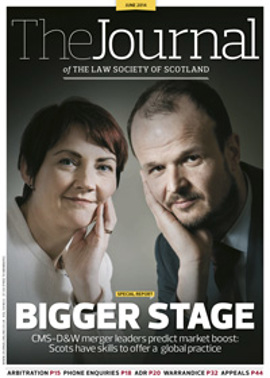President's column

A big year lies ahead – for the country, and the Scottish solicitors’ profession. And given that the eyes of the world will be on Scotland – due, of course, to the independence referendum, but also other major events such as the Commonwealth Games and Ryder Cup – it is a particularly exciting time to take over the presidency of the Society.
First, though, an introduction. A working life in the law, including 21 years on the Society’s Council – the longest-serving member, I am reliably told – has allowed me the privilege of meeting many colleagues, from all sectors of the profession. And playing my part in running a medium-large practice with six offices around Edinburgh and Fife has provided an insight into the ever-changing challenges and ambitions of those in bigger firms as well as high street practitioners. With that in mind, my commitment for the year ahead is to ensure the Society remains relevant, approachable and accessible to all our members.
While there are signs of improvement, the economic conditions are still tough for firms large and small. And the demands are often shared – planning, budgeting, satisfying the needs of clients and attempting to secure new work. Given that firms typically do not have an asset base to raise funds against, and with banks no longer regarding the legal profession as a guaranteed financial success, many also face liquidity pressures. Alongside these challenges exists the constant balance of providing excellent legal services to the highest professional standards, while ensuring a business model is in place that meets the requirements of today’s marketplace.
The Society is determined to support firms as they try to develop and grow their practices, for instance by doing all we can to encourage the introduction of new business structures, which I believe will provide opportunities for firms of all sizes. Hopefully, progress will be made in the coming year.
Momentous times
And what a year awaits. For the next three months and beyond, much attention will inevitably focus on the referendum on whether Scotland should become an independent country. While firmly neutral on the question of independence itself, the Society has stressed its determination to help create an informed and respectful discussion ahead of the vote in September.
Our well-received discussion paper, published last year, outlined a series of key questions for both the Scottish and UK Governments. Our conference this April on Scotland’s constitutional future provided a platform for high-profile figures in the debate, including the Scottish Secretary, Alistair Carmichael, and Deputy First Minister Nicola Sturgeon. Later in the summer, the Society will produce a comprehensive position paper as a follow-up to the discussion document. Further events are also planned. The Society will remain at the heart of the debate and, subsequently, at the forefront of any changes that take place, whether as the result of a Yes or a No vote.
Also a priority is preparing for next April’s Commonwealth Law Conference in Glasgow, one of the biggest and most prestigious gatherings of solicitors in the world. Successfully bidding to host the event was a major achievement and the conference itself, with the theme of “Resources, responsibilities and the rule of law”, will remind us of some of the fundamentals of the rule of law and freedom of speech that we take for granted. I am confident it will also generate a feel-good factor about the work of solicitors and provide a fantastic opportunity to showcase Glasgow, Scotland and the Scottish legal profession. The Society is working hard to ensure it will be a great success.
A number of familiar issues are likely to remain on the justice agenda over the next 12 months. The Courts Reform (Scotland) Bill is currently passing through Holyrood. The Society has questioned proposals to raise the threshold for cases in the Court of Session from £5,000 to £150,000 – suggesting a limit of no more than £50,000 would be more appropriate – and introduce a three-month time limit for judicial review, which we believe could restrict access to justice. We will continue to argue for improvements to the bill during its passage. Likewise, we will highlight any access to justice issues that arise from the ongoing programme of court closures and changes to the legal aid system.
The weeks immediately before and after taking up the presidency have already given me a flavour of what lies ahead. Discussions with big firms, faculties and bar associations, offering and learning lessons from the other UK and Ireland law societies, exploring the future of the legal profession at a Strathclyde University think tank, and attending a Commonwealth Law Conference organising committee meeting. All opportunities to share experiences, find common cause and ensure the Society remains relevant, approachable and accessible to our members.
In this issue
- “It is a wise father...”
- Let the Games begin
- Power for change: EHRC's litigation strategy
- Framework for tribunal reform
- MIAMs: making meetings the end?
- Legal locksmiths: locking and unlocking charitable gifts and bequests
- Reading for pleasure
- Opinion: Marjory Blair and Kirsty Miguda
- Profile
- Book reviews
- President's column
- The big day unveiled
- Identity crisis?
- Arbitration: the way forward in disputes?
- A brand new framework
- Hello? Hello?
- A mediation story: The Mediator's Log
- ADR: Faculty makes its pitch
- Justifying extensions
- Season of change
- Beneficial changes
- Stormy waters
- Which way will it jump?
- People on the move
- Games-time goals
- Acceptance or warrandice?
- Getting ready for the "designated day"
- Turning concern into action
- Ask Ash
- Here comes 2012
- Ploughing a lone furrow
- Safety in networking
- Law: an insight job
- Sheriff decision causes power of attorney alert
- Law reform roundup
- "Find a registered paralegal"






